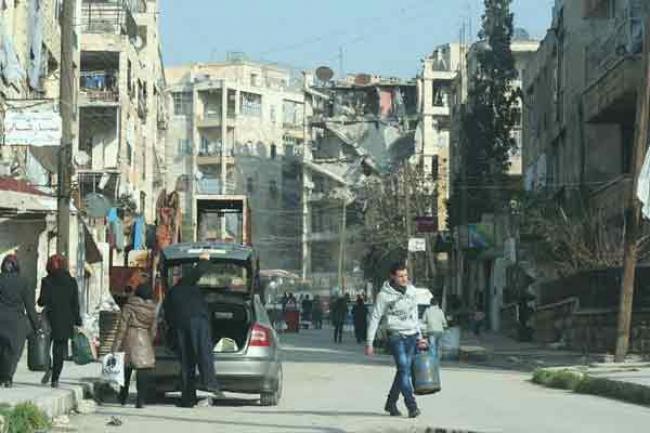Just Earth News 16 Jul 2016, 09:06 am Print

OCHA/Josephine Guerrero
“The country is already a gigantic, devastated graveyard,” the UN High Commissioner for Human Rights, Zeid Ra’ad Al Hussein, said in a statement issued by his office. “The number of war crimes already committed surpasses the worst nightmares. But it is in the power of both attacking and defending forces – and their foreign backers – to minimize further civilian casualties and avoid further crimes and atrocities. They must do so.”
He added that even if the forces “have become so brutalized they do not care about the innocent women, children and men’s whose lives are in their hands, they should bear in mind that one day there will be a reckoning for all these crimes.”
While exact figures are extremely hard to establish, the Office of the UN High Commissioner for Human Rights (OHCHR) said that there are at least 150,000 civilians who are now effectively totally trapped in the opposition-held part of Aleppo.
“We are deeply worried about what will happen to them as the fighting closes in and intensifies, while their already minimal supplies of food, water and medicine run out,” Zeid said.
Meanwhile, as Government forces and their allies advance on the opposition-held eastern part of the city, armed opposition groups have escalated shelling in Government-held areas of Aleppo.
“Advancing forces recently captured several areas in southern and western parts of Darayya, squeezing the remaining 8,000 civilians into an even narrower space of around one square kilometre of devastated urban ruins,” the High Commissioner said of an area in Western Ghouta, close to Damascus. Darayya has been under siege by Government forces and their allies since 2012.
In addition, the situation in Manbij, in eastern rural area of Aleppo Governorate, is believed to be deteriorating dramatically due to fighting between ISIL and the Syrian Democratic Forces (SDF), with near-daily air and ground strikes since June. Approximately 70,000 civilians are trapped in the city, according to UN figures.
Zeid added that his Office (OHCHR) had received reports of a number of civilians, including women and children being killed and injured by airstrikes and ground strikes, as well as by landmines laid by ISIL.
“Civilians have also reportedly been killed if they leave their homes or attempt to flee,” Zeid said. “Families are unable to access local cemeteries to bury their relatives who have died or been killed, and are burying them in their gardens or keeping the corpses in bunkers. The town has no electricity or water at present, and no medical facilities are known to be operating. As the SDF closes in on the city, ISIL has not permitted civilians to leave the area.”
- India rejects allegations, urges Pakistan to tackle its ‘home-grown ills’
- Massacre in Islamabad: ISIS takes responsibility for deadly Pakistan blast
- Friday turns fatal: 31 dead, 169 injured in shocking Pakistan mosque blast
- Explosion at packed mosque in Pakistan turns Friday prayers into scene of carnage, 15 dead
- Security forces handicapped: Pakistan Defence Minister’s shock admission on Baloch violence





-1763561110.jpg)
